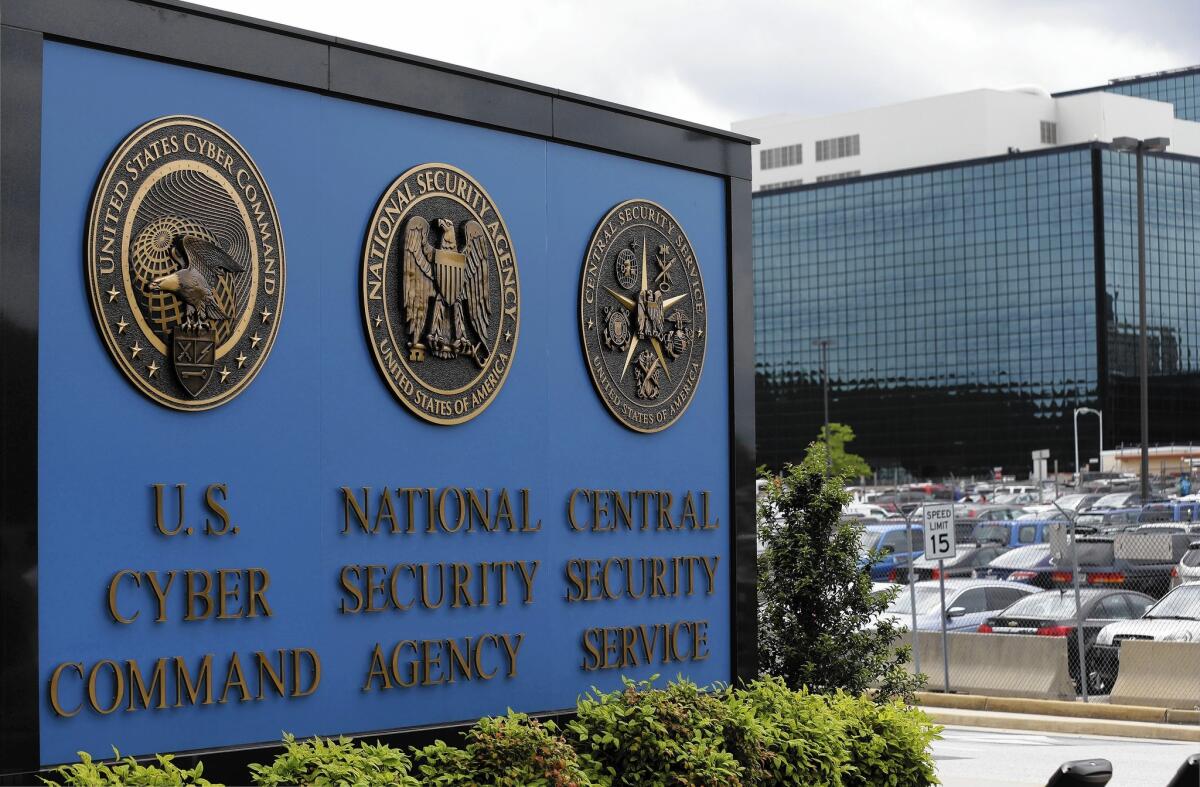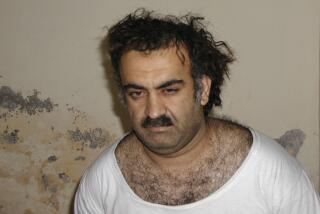Could data collection have stopped 9/11? White House thinks so

WASHINGTON — Many of President Obama’s closest advisors have embraced a controversial assessment of one of the National Security Agency’s major data collection programs — the belief that the Sept. 11, 2001, terrorist attacks could have been prevented had government then possessed the sort of vast trove of Americans’ telephone records it holds now.
Critics of the NSA program, and some scholars of America’s deadliest terrorist attack, strenuously dispute the view that the collection of phone data would necessarily have made a difference or that the possibility justifies the program now. The presidential task force that reviewed surveillance operations concluded last month that the program “was not essential” to preventing terrorist attacks.
But as the president finalizes plans for a speech on Friday announcing his proposals to change intelligence operations and oversight, the widespread agreement at the most senior levels of the White House about the program’s value appears to be driving policy. As a result, the administration seems likely to modify, but not stop, the gathering of billions of phone call logs.
In recent White House meetings, Obama has accepted the “9/11” justification, aides say, expressing the belief that domestic phone records might have helped authorities identify some of the skyjackers who later crashed passenger jets in New York, the Washington area and Pennsylvania, killing nearly 3,000 people.
TIMELINE: The year in politics
He believes the main problem with the program is one of perception: Many Americans don’t trust the NSA, one of the most secretive of spy agencies, to respect civil liberties.
In Friday’s speech, the president is expected to propose steps that he hopes will make Americans more comfortable with the program, but not greatly reduce its scope as a counter-terrorism tool. One such change would be to shift the assembling and archiving of telephone “metadata” from NSA servers in Ft. Meade, Md., back to the telephone companies, or to a private third party. But aides say he is unlikely to end the program altogether.
Under the current program, the government collects and stores metadata — numbers dialed and call times — involving virtually all telephone calls in or through the United States. The program does not collect the contents of conversations.
“This capability was put in place after 9/11 for a good reason,” said a senior administration official who asked not to be identified discussing sensitive deliberations. “The question we have to examine is whether the perception of privacy intrusion outweighs the operational value. It’s possible we could get that same information … in other ways, but it’s slower.”
Shifting the NSA archive to private control would be “tricky,” said Sen. Richard J. Durbin (D-Ill.), a member of the Judiciary Committee. If the NSA can access the data too easily, Durbin said, “there’s an assumption that it’s partly created or controlled by government, and that doesn’t change people’s skepticism.”
Privacy and civil liberties activists say the government has overstated the utility of amassing billions of phone call logs. They argue that it is too far-reaching and too intrusive, and that other effective counter-terrorism tools exist.
The “big question … [is] whether our government is going to spy on Americans,” said Michelle Richardson, legislative counsel for the ACLU.
Over the last half-year, government officials have had to abandon several of their claims about the effectiveness of the metadata collection program. When former NSA contractor Edward Snowden began disclosing classified documents to the news media, intelligence officials initially said the ability to secretly trace a suspect’s network of calling partners had helped prevent scores of terrorist attacks.
Pressed for details by members of Congress and others, officials steadily backed away from those assertions.
In the end, they cited only one U.S. case in which they still say the NSA archive played a crucial role: A San Diego cab driver and three others were convicted in November of sending about $8,500 to the Shabab, the extremist group in Somalia that has launched deadly attacks across East Africa, in part because of clues collected from the phone logs.
Whether U.S. authorities would have used similar data to identify any of the 19 hijackers before Sept. 11, and whether that would have stopped others in the plot, is impossible to know. The presidential commission that investigated the 2001 attack blamed more fundamental problems, including the CIA’s failure to inform the FBI that several suspected Al Qaeda members had entered the United States and were living in San Diego.
PHOTOS: President Obama’s past
The strongest argument for how the program might have helped, one cited in White House discussions, involves Khalid al Mihdhar, a Saudi who helped fly an American Airlines jet into the Pentagon.
After arriving in San Diego in January 2000, Mihdhar made several phone calls to an Al Qaeda safe house in Yemen. U.S. intelligence was monitoring calls made to the safe house, then-FBI Director Robert S. Mueller III told Congress last summer, but didn’t realize the caller was in America.
If the telephone archive had existed at the time, Mueller said, the NSA could have linked the numbers in Yemen and San Diego, identified Mihdhar and “derailed” the plot. Gen. Keith Alexander, the head of the NSA, made a similar argument.
According to the Sept. 11 Commission, however, the NSA already had learned Mihdhar’s name in 1999 in a call that linked him to Al Qaeda, but did not pass his name or that of his friend Nawaf al Hazmi, another future hijacker, to the FBI.
In December that year, the CIA broke into Mihdhar’s hotel room in Dubai, United Arab Emirates, and photographed his passport, which had a U.S. visa. The CIA didn’t warn the State Department to revoke the visas, didn’t ask immigration authorities to bar Mihdhar or Hazmi at the border and didn’t inform the FBI that suspected terrorists were in California.
If the FBI had been warned, agents already had ample legal authority to review Mihdhar’s telephone records or get a warrant to tap his phones, read his emails and track his movements.
The FBI missed other opportunities to thwart the 2001 plot that it probably would pursue today.
In summer 2001, agents had arrested Zacarias Moussaoui, another Al Qaeda member, who aroused suspicion at a flight school in Minnesota. But they failed to obtain a search warrant for his computer. And FBI managers ignored a warning by a field agent in Phoenix that Osama bin Laden might be sending pilots to train at U.S. flight schools.
Today, as part of the initiatives implemented since 2001, federal watch lists bar suspected terrorists from boarding U.S.-bound aircraft or entering the country, and U.S. law enforcement and intelligence agencies share more information and work far more closely in counter-terrorism cases.
James R. Thompson, a former governor of Illinois who served on the Sept. 11 Commission, said the value of the bulk data collection was “a given” for counter-terrorism efforts even if it might not have prevented the 2001 attacks. He also said the concerns about abuse were overblown.
“We don’t have any examples of how the average American citizen’s privacy is being harmed by the collection of this data,” he said.
NSA officials say they authorize analysts to access the database only a few hundred times a year, and only to determine whether suspected terrorists or spies overseas are in contact with people in the United States. In 2012, NSA analysts looked into calls involving 288 telephone numbers, John Inglis, the NSA’s top civilian official, said in a recent interview with NPR. Examining the numbers that were in contact with those initial 288 as well as those in contact with that second tier meant the agency looked at about 6,000 phone numbers in total that year, he said.
To date, Snowden’s disclosures have produced no evidence to suggest the NSA or other agencies have sought to search details about the personal lives or activities of Americans other than terrorism suspects.
More to Read
Start your day right
Sign up for Essential California for news, features and recommendations from the L.A. Times and beyond in your inbox six days a week.
You may occasionally receive promotional content from the Los Angeles Times.








